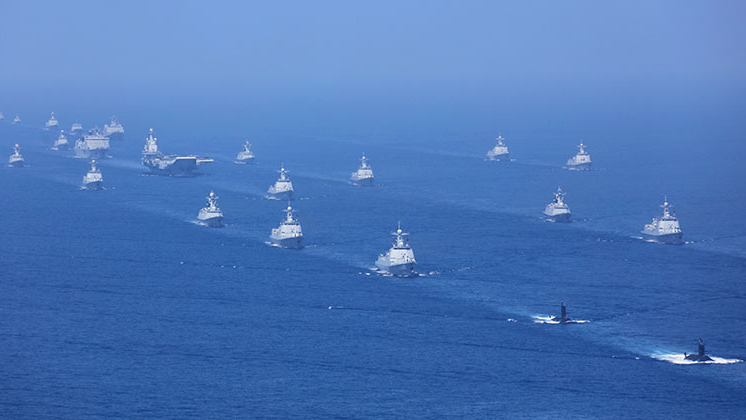
Rain clouds loom over the U.S. aircraft carrier USS Ronald Reagan as it is anchored off Manila Bay, the Philippines, August 7, 2019. /AP
Rain clouds loom over the U.S. aircraft carrier USS Ronald Reagan as it is anchored off Manila Bay, the Philippines, August 7, 2019. /AP
Editor's note: Keith Lamb is a University of Oxford graduate with an MSc degree in Contemporary Chinese Studies. His primary research interests are international relations of China and China's "Socialism with Chinese Characteristics." The article reflects the author's opinions, and not necessarily the views of CGTN.
In the UK and the U.S., I rarely if ever meet anyone that does not characterize China's territorial claims in the South China Sea (SCS) as being anything other than a blatant land grab from neighboring states. At best China's actions are crudely characterized as imperial revanchism. At worst, their claims, spread widely in the Western media, are crudely compared to fascist Germany. This results in the desired Pavlov dog reaction from audiences who instilled with a mixture of fear and loathing are often only too ready to tacitly sanction the use of force and antagonistic measures by their elites.
There are many overlapping claims in the South China Sea. While we in the West do not have to agree with China's specific claims, we must, at least, be cognizant that their claims are legitimate and rational. By recognizing this simple fact China's actions and claims in the SCS must be re-evaluated and discussed in a level-headed manner beyond the moral pretenses that the Western business media and right-wing political elites frame China's claims in the SCS.
Taiwan in regard to China's claims in the SCS, besides being a footnote in the conversation, is rarely raised in the West and for good reason. By raising Taiwan, it becomes impossible to use the common "knee jerk narratives" of an "unreasonable China making up senseless claims to land they know does not belong to them." In addition, the Taiwanese independence movement loses legitimacy.
China's claim over the SCS is historically based on their claim that the islands in the SCS were first developed by China. This includes the, relatively close to China, Xisha (Paracel) Islands and the Nansha (Spratly) Islands that are further away and closer to Malaysia. Having islands and territory closer to another major landmass than the sovereign state is not unprecedented. The U.K. claims sovereignty of the disputed Falkland Islands close to Argentina and the Channel Islands are close to France. Likewise, the U.S. has the far-flung territory of Guam close to Asia and various other dependencies not linked to the continental United States.
Importantly, in regards to the SCS, Taiwan has the same claim as the Chinese mainland. Both of them decorate their maps of the SCS with a similar U-shaped dash line to mark their territory.
Unsurprisingly, when Taiwan, allied with the U.S., was recognized as the legitimate government of the whole of China, the U.S. had no qualms about upholding China's sovereign rights in the SCS. After WWII, both the Nansha and Xisha Islands occupied by Japan were returned to China which later set up a garrison in the Nansha Islands in 1946. Recognizing the land in the South China Sea as territory belonging to China, the International Aviation Organisation in 1955 tasked Taiwan with setting up meteorological aviation stations in the SCS.
Taiwan's leader Tsai Ing-wen, also the leader of the Democratic Progressive Party, pushes for independent Taiwan statehood. As such one would think this would negate Taiwan's claims to land in the SCS especially as the Xisha and Nansha Islands are significantly further away from Taiwan than the Chinese mainland. In fact, these claims are upheld by Tsai Ing-wen who also rejected the 2016 ruling in favor of the Philippines by the Court of Final Arbitration in the Hague. Immediately after the ruling, Tsai Ing-wen, after inspecting naval units, promptly sent vessels to patrol Taiwan's claims in the SCS.

Aircraft carrier Liaoning, submarines, vessels and fighter jets take part in a review in the South China Sea, April 12, 2018. /Xinhua
Aircraft carrier Liaoning, submarines, vessels and fighter jets take part in a review in the South China Sea, April 12, 2018. /Xinhua
Then why don't we hear the hysteria from the Western media and politicians over Taiwan's sovereign claim over the South China Sea as we encounter regularly with China's?
By bringing up Taiwan's claims in the SCS, calls for independence are on shaky ground. Taiwan does not just claim the islands in the SCS, it also administers some of the best islands there. This means the ROC controls territory in three to four Chinese provinces. It controls the whole of Taiwan Province; it still administers parts of Fujian Province on the other side of the Taiwan Strait while the Xisha and Nansha islands today are administered under Hainan Province but under the KMT rule they were part of Guangdong Province. Clearly, highlighting such a messy fact makes it hard to untangle the PRC from the "Republic of China."
Besides the thorny cross-strait issue, there is another good reason why Taiwan's claims remain silent. Firstly, it becomes obvious that at one point the U.S. did support China's claims to the SCS. This then begs the question as to why the claims of Taiwan which had a one-party system up to 1997 were considered legitimate, while the claims of the PRC which is led by the Communist Party of China are somehow invalid now. It would appear the remaining factor is a Cold War dogmatic resistance to communist states even those that play by market rules.
Secondly, mentioning Taiwan in the same sentence as China and the South China Sea negates the atrocity propaganda disseminated in the West. The Chinese state as aforementioned is lambasted as a rogue one; one whose SCS territorial claims are highly irrational and illegitimate. Thus, the actions of the PRC are used to portray a bellicose one-party communist state that is set on threatening the world order and liberal democracies.
However, the fact that Taiwan has the same claims does not fit into the neat script drawn up in the Western media and its think tanks. Taiwan's near-identical claims, as well as their determination to defend these claims, are enough to prove that the PRC's historical claims to the SCS are not invalidated by its political-economic system, nor are they unreasonable ones. As such, Taiwan's claims are an inconvenient truth that must be ignored to keep up the pretense of a Chinese state that acts unreasonably.
Recognizing Taiwan's claims leads to opening a can of worms that the West would rather not open. It leads to too many questions regarding Taiwan's independence and lends legitimacy to China's claims. If China is a rational actor with legitimate claims, then it no longer is reasonable for the West's elites to terrorize its own populations into supporting irrational hot-headed partisan solutions when neutrality and even-handedness are required.
(If you want to contribute and have specific expertise, please contact us at opinions@cgtn.com.)